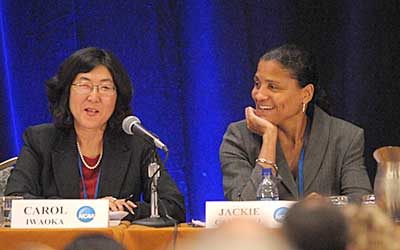NCAA News Archive - 2008
« back to 2008 | Back to NCAA News Archive Index
|
The NCAA News
Division I Management Council Chair Jackie Campbell came to intercollegiate athletics in a round-a-bout way. A two-sport student-athlete at Virginia, she once thought her future was in professional sports administration. But more than 20 years later, Campbell, currently an associate commissioner of the Atlantic-10 Conference, is in the midst of an intercollegiate athletics career that includes stints at the NCAA national office and two campuses.
As an undergraduate, she knew that she didn’t have the patience to be a coach. She went to graduate school on an NCAA postgraduate scholarship for ethnic minorities and women seeking a career in athletics, and interned in the athletics department at Pittsburgh.
“It was more because of my involvement in sports that I had an interest in it,” Campbell said. “But you didn’t see a lot of minorities in administration more than 20 years ago. It wasn’t something you thought about doing because you didn’t see anybody like yourself.”
When she finally got her first job in intercollegiate athletics, it was in the legislative services department at the NCAA national office, an opportunity for which she is grateful. She learned the NCAA Manual inside-out, answering membership questions every day. She was able to take a top-down view of Division I, observing where the division – and the Association – were heading. Her job was to serve the membership.
She sees her function at the conference level similarly, albeit with a smaller constituency. As the league’s compliance administrator, she is a resource for member schools.
On campus – she’s worked at both Connecticut and Maryland – it’s a little different, she said, where the constituents are the student-athletes, the coaches and college officials. “People are constantly in and out of your office, and those interactions are an integral part of the job,” she said.
Being on campus also nurtured her love of competition.
“Having been an athlete, I just enjoy watching good sports,” Campbell said. “The interaction with the student-athletes is important, too. A lot of people forget why we’re in it, that if we didn’t have the student-athletes, we wouldn’t have a job.”
Sometimes, she said, particularly on campus, the “in and out” of her office took up the better part of her day, leaving her only after-hours to get items crossed off her to-do list. Despite the Association’s focus on life-work balance in recent years, Campbell said she is not a model for a balanced life.
When she was younger, she didn’t notice it so much, she said – she loved her job and everything she was doing.
“We all had way too much to do, and you just stayed until you got it done,” she said. “But you get older and you notice it. You notice that you may have missed out on some things. I have yet to figure out for me personally the best way to get there.”
Almost as soon as she left the national office for her first stint at the Atlantic-10 (she returned after the two campus stops), Campbell became involved in the governance of the division from the membership side. When she left the national office, her title was assistant chief of staff for Division I, and she was the staff member at the side of the Management Council chair. As the Management Council chair for the last year – and the last chair of the group in its current incarnation, she said it’s gratifying to be on the other side.
“You know, as a staff member, you provide resources and guidance, but you can’t throw your opinion in,” she said. “I like to give a little bit more input. I wanted to give my own opinion.”
 As Division I reorganizes itself from the Management Council and two cabinets into a structure featuring a Leadership and Legislative Council and five smaller cabinets, Campbell said she believes the move will help groups focus more on individual issues and better guide the future of the Division. She is a candidate in fact for the Legislative Council.
As Division I reorganizes itself from the Management Council and two cabinets into a structure featuring a Leadership and Legislative Council and five smaller cabinets, Campbell said she believes the move will help groups focus more on individual issues and better guide the future of the Division. She is a candidate in fact for the Legislative Council.
Campbell sees the diversity of the Division I membership in mission and resources as an area of interest in the future. The membership moratorium currently in place in Division I, and the discussions surrounding the characteristics of a Division I institution, will be pivotal in shaping the future of athletics in the division.
“Having been at different schools with a lot of different issues and different budgets and resources, it’s going to be interesting,” she said. “The membership is so diverse.”

